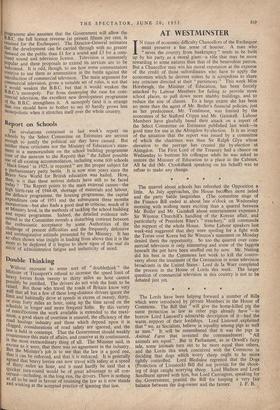Double Thinking
Without recourse to some sort ,of " doublethink " the Minister of Transport's refusal to increase the speed limit of heavy lorries from twenty to thirty miles an hour cannot Possibly be justified. The drivers do not wish the limit to be raised. But those who travel the roads of Britain know very well that all but a few of these long-distance drivers ignore the limit and habitually drive at speeds in excess of twenty, thirty, or even forty miles an hour, using up the time saved on the' schedule in longer and more frequent halts. By this variety of restriOtionism the work available is extended to the maxi- mum, a good share of overtime is ensured, the efficiency of the road haulage 'industry and those which depend upon it is clogged considerations of road safety are ignored, and the law is held in contempt. That the Government should weakly Fonntenance this state of affairs, and connive at its continuance, is the most extraordinary thing of all. The Minister said, in excuse as it were that there was no agreement in the industry. But the Minister's job is to see that the law is a good one. that it can be enforced, and that it is enforced. It is generally agreed that heavy lorries can now travel with safety at a speed of thirty miles an hour, and it need hardly be said that a quicker turn-round would be of great advantage to all con- cerned—including, in the long run, the drivers. There is nothing at all to-be said in favour of retaining the law as it now stands and winking at the accepted practice of ignoring that law.


































 Previous page
Previous page